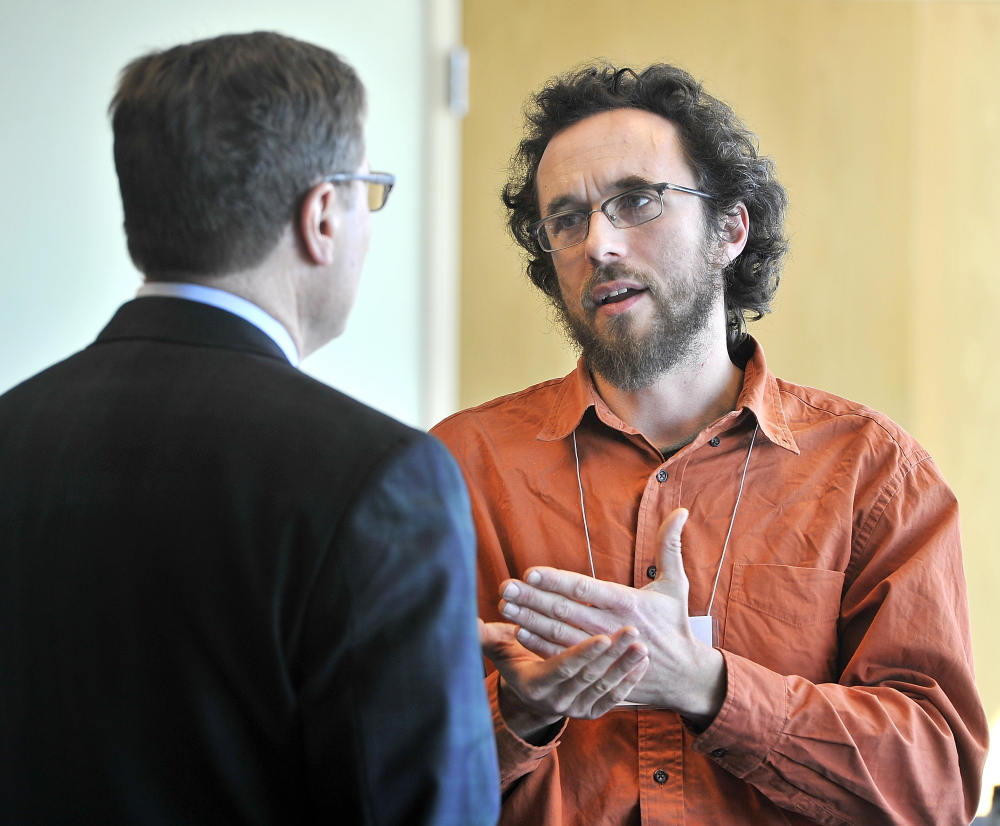We all know the world values a multitasker, but Jonah Fertig’s extensive credentials suggest he takes multitasking to a new level. If you get an email from him, Cooperative Fermentation is the first line under his name, and it’s bolded. Underneath that are the words “cooperator, consultant, facilitator, teacher, chef, artist.” We were intrigued and puzzled. (Does Cooperative Fermentation call for making yogurt in large, amiable groups?)
We called up Fertig, a co-founder of Local Sprouts Cooperative and a member of the steering committee for the Mayor’s Initiative for a Healthy and Sustainable Food System, both in Portland, to get the real story on those job descriptions and his lengthy involvement with the local food movement. He lives in Arundel on an organic farm. Unsurprisingly, it is a cooperative.
FERMENTING CHANGE: Fertig believes in the transformation of our food system through creating cooperatives. Cooperative Fermentation is the name of one of his projects for the Portland-based Resiliency Hub, an effort to accelerate the growth of cooperatives. The fermentation part is a reference to “the helpful bacteria that ferments ordinary cabbage into delicious (sauer)kraut,” but the overall goal is to bring communities together. Fertig has done a lot of that in his day.
He just participated in a MOFGA event about urban agriculture (he’s investigating establishing an urban farm in Portland as part of the Mayor’s Initiative). Right now his main focus is the work he’s doing for the Cooperative Development Institute, where he works with growers interested in farming cooperatively.
WHO WOULD THAT BE? He’s working with a few different groups of refugee farmers in Maine, including a Lewiston-based group called the Sustainable Living Relief Organization. It’s made up of mixed-vegetable farmers from Maine’s Somali Bantu community, some of whom have completed Cultivating Community’s farmer training program and want to expand their operations. “They are really interested in adding livestock, goats or other animals,” Fertig said. He’s working with them on a cooperative model that would share land and farming equipment and potentially market their products jointly. “A lot of it is building relationships and networking,” Fertig said. He laid the groundwork for such relationships when he was buying food for Local Sprouts.
BE HERE NOW: Speaking of, he was a key force behind developing Local Sprouts, which started as a local food cooperative in 2007 and expanded into a catering operation and cafe (at 649 Congress St. in Portland). He left Local Sprouts at the beginning of 2014. “It was definitely challenging to have started a cooperative and seeing it grow and then to step away from your baby,” he said. Well, not totally his baby; “when I left last year there were over 20 worker-owners.”
LOCAL SPROUT: His parents gardened and the Yarmouth native grew up loving cooking and food. “I wanted to be a chef by day and a cartoonist by night,” Fertig said. He worked at the former Baker’s Table in Portland in the mid-’90s and at a vegan cafe in Brooklyn’s Williamsburg neighborhood in the late ’90s. “We were trying to do raw vegan food,” Fertig said. “It didn’t work. There wasn’t enough of a market for it then.… Now there are probably several raw vegan cafes in Williamsburg.”
LET’S GET POLITICAL: Fertig developed his interest in community organizing, activism and local foods as an art student at New York University. “I was living in the city and feeling pretty disconnected from the land and food,” Fertig said. He fell in with a group working to save some community gardens in the South Bronx and the Lower East Side. A puppet show was involved. “It was really inspiring,” Fertig said. “I had gone to protests, and done letter writing (campaigns) but to be working with something that is tangible and real.… Food is something that brings people together.”
BACK TO MAINE: He did the obligatory 20-something time on the West Coast, then came back to Maine in 2002. “There were a lot of great things going here,” he said. “So I stuck around.” His first action was to get involved with the Victory Gardens Project in central Maine, a grassroots enterprise to raise consciousness about corporate and government control while creating self-sufficiency through food production. He then helped established People’s Free Space in Portland, which led to the creation of Local Sprouts Cooperative. “We decided to create a worker cooperative because we felt it was important to be examining the ownership structure of the business as well,” he said. “To create a mode for ownership that wasn’t being seen in the area.”
WHO IS ON FIRST? How did he determine the order of things in his tagline? Why is “cooperator” first? Fertig laughed at this question. “My primary professional work is building cooperatives,” he said. “People know about cooperatives generally, but I think there is a lack of knowledge about them.” Right now he’s teaching a three-month-long cooperative design lab, which informs people who want to start co-ops about how to pull that off.
WHERE’S THE ART? “As you can see, I definitely do a lot of different things,” Fertig said. “But art has always been a real key to my life. I have always made various forms of art. I play music. I draw. These days, I mostly play around campfires.” When he was a teenager he used to play in punk bands in Portland, but he’s coy about what the bands were called. “I don’t know if I want them published!” he said. Why punk? “The do-it-yourself ethic of punk definitely appealed to me.” The real reason for including “artist” in his email signoff? “My tagline is also a reminder to myself to make more art.”
Send questions/comments to the editors.




Comments are no longer available on this story